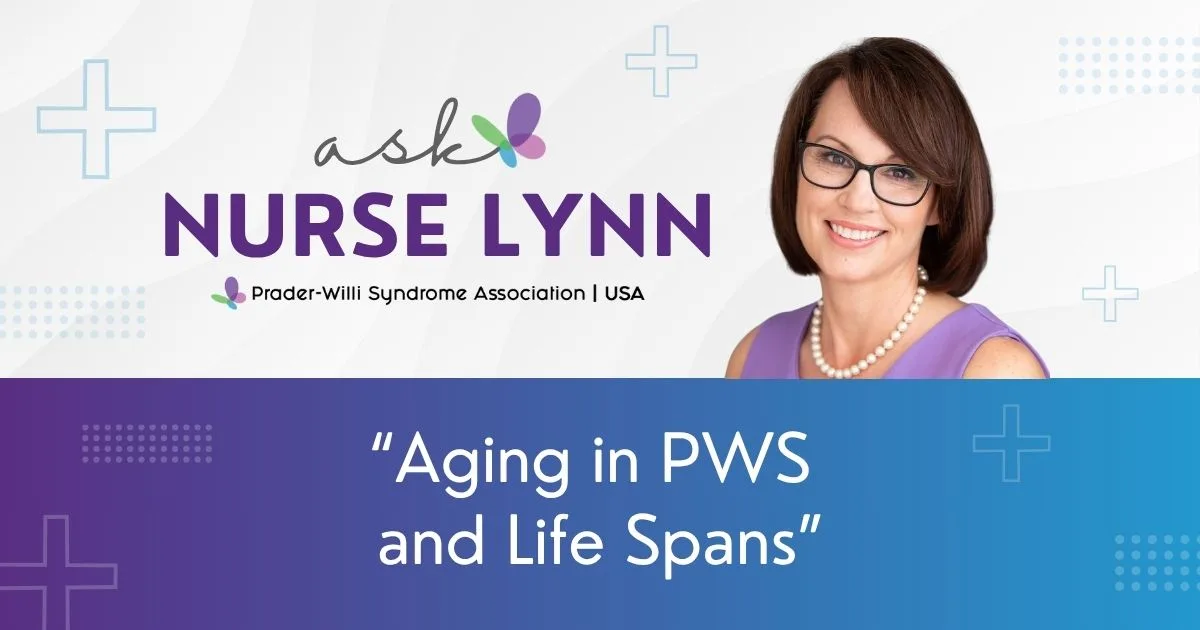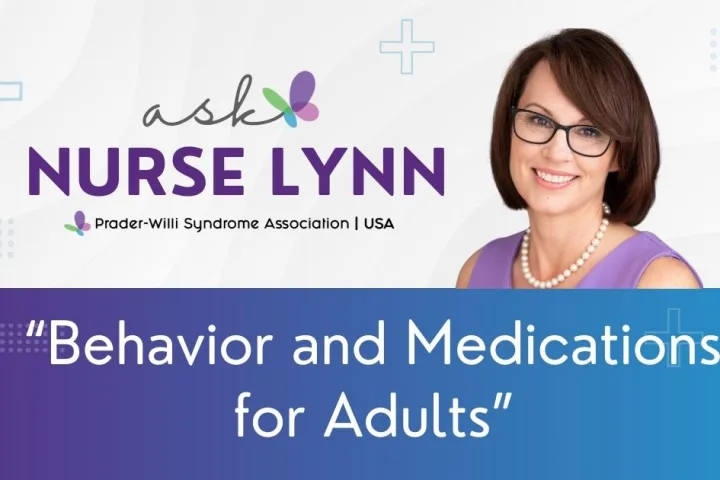Question:
Female, 31 years old, UPD subtype
Do people with PWS age at an accelerated rate compared to those who do not have this syndrome? My 31 year old daughter was just diagnosed with arthritis in her knee. As I look back on her health history, I can see how many of her conditions are related to accelerated aging….everything from losing baby teeth at 4 or 5, to a bone age of 12 when she was 9, to varicose veins in her 20s, to arthritis at 31 (and many other issues as well). If so, what kind of life span can I expect? When she was younger, I was told obesity-related conditions would severely limit her lifespan. As she got older, I was told if her health and weight were monitored closely, she could live a normal life span. Now, I am wondering what the current thinking is. Thank you for your insights.
Nurse Lynn’s Response:
Some people with PWS may show signs of aging earlier than usual, but this doesn’t happen to everyone, and how it shows up can be very different from person to person. What you’ve noticed in your daughter—like losing baby teeth early, having bones that seemed older than her age, getting varicose veins in her 20s, and now developing arthritis at 31—matches what researchers are beginning to learn about aging in people with PWS.
Early signs that may point to faster aging include losing baby teeth unusually young and having bones that develop faster than expected. Scientists have also found that some young adults with PWS have shorter telomeres—these are protective parts at the ends of DNA strands that tend to get shorter as we age. Shorter telomeres are often linked with aging and age-related health problems. Brain scans have also shown that some adults with PWS have brains that appear older than their actual age, which may suggest early brain aging or differences in how the brain develops over time.
As they get older, some people with PWS may develop health problems we normally associate with aging—such as heart disease, type 2 diabetes, skin issues, or joint problems—earlier than expected. In their 40s or 50s, they may also need more help with physical tasks and day-to-day care due to reduced strength, movement, or mental stamina. It is important to remember that not everyone with PWS will experience these changes, and good medical care can make a big difference.
In the past, people with PWS were thought to have much shorter lifespans, mostly because of health issues related to obesity, like breathing or heart problems. But today, things have improved. With early diagnosis, healthy eating, regular medical care, and treatments like growth hormone therapy, many people with PWS are living longer, healthier lives. Some newer medications that help control excessive hunger (hyperphagia) are also showing promise in supporting long-term health.
I have linked some articles/ videos that may be of interest to you.
Resources:
https://pubmed.ncbi.nlm.nih.gov/31689713/
https://www.sciencedirect.com/science/article/pii/S2213158219300142?utm_source=chatgpt.com
https://www.pwsausa.org/aging-research-in-prader-willi-syndrome/?utm_source=chatgpt.com
https://www.youtube.com/watch?v=0IbxiQERDbQ
https://www.youtube.com/watch?v=yrDdfCuutNA
Do you have a non-emergency medical question for Nurse Lynn? Submit your question here:
Share this!





 Perry A. Zirkel has written more than 1,500 publications on various aspects of school law, with an emphasis on legal issues in special education. He writes a regular column for NAESP’s Principal magazine and NASP’s Communiqué newsletter, and he did so previously for Phi Delta Kappan and Teaching Exceptional Children.
Perry A. Zirkel has written more than 1,500 publications on various aspects of school law, with an emphasis on legal issues in special education. He writes a regular column for NAESP’s Principal magazine and NASP’s Communiqué newsletter, and he did so previously for Phi Delta Kappan and Teaching Exceptional Children. Jennifer Bolander has been serving as a Special Education Specialist for PWSA (USA) since October of 2015. She is a graduate of John Carroll University and lives in Ohio with her husband Brad and daughters Kate (17), and Sophia (13) who was born with PWS.
Jennifer Bolander has been serving as a Special Education Specialist for PWSA (USA) since October of 2015. She is a graduate of John Carroll University and lives in Ohio with her husband Brad and daughters Kate (17), and Sophia (13) who was born with PWS. Dr. Amy McTighe is the PWS Program Manager and Inpatient Teacher at the Center for Prader-Willi Syndrome at the Children’s Institute of Pittsburgh. She graduated from Duquesne University receiving her Bachelor’s and Master’s degree in Education with a focus on elementary education, special education, and language arts.
Dr. Amy McTighe is the PWS Program Manager and Inpatient Teacher at the Center for Prader-Willi Syndrome at the Children’s Institute of Pittsburgh. She graduated from Duquesne University receiving her Bachelor’s and Master’s degree in Education with a focus on elementary education, special education, and language arts. Evan has worked with the Prader-Willi Syndrome Association (USA) since 2007 primarily as a Crisis Intervention and Family Support Counselor. Evans works with parents and schools to foster strong collaborative relationships and appropriate educational environments for students with PWS.
Evan has worked with the Prader-Willi Syndrome Association (USA) since 2007 primarily as a Crisis Intervention and Family Support Counselor. Evans works with parents and schools to foster strong collaborative relationships and appropriate educational environments for students with PWS. Staci Zimmerman works for Prader-Willi Syndrome Association of Colorado as an Individualized Education Program (IEP) consultant. Staci collaborates with the PWS multi-disciplinary clinic at the Children’s Hospital in Denver supporting families and school districts around the United States with their child’s Individual Educational Plan.
Staci Zimmerman works for Prader-Willi Syndrome Association of Colorado as an Individualized Education Program (IEP) consultant. Staci collaborates with the PWS multi-disciplinary clinic at the Children’s Hospital in Denver supporting families and school districts around the United States with their child’s Individual Educational Plan. Founded in 2001, SDLC is a non-profit legal services organization dedicated to protecting and advancing the legal rights of people with disabilities throughout the South. It partners with the Southern Poverty Law Center, Protection and Advocacy (P&A) programs, Legal Services Corporations (LSC) and disability organizations on major, systemic disability rights issues involving the Individuals with Disabilities Education Act (IDEA), Americans with Disabilities Act (ADA), and the federal Medicaid Act. Recently in November 2014, Jim retired.
Founded in 2001, SDLC is a non-profit legal services organization dedicated to protecting and advancing the legal rights of people with disabilities throughout the South. It partners with the Southern Poverty Law Center, Protection and Advocacy (P&A) programs, Legal Services Corporations (LSC) and disability organizations on major, systemic disability rights issues involving the Individuals with Disabilities Education Act (IDEA), Americans with Disabilities Act (ADA), and the federal Medicaid Act. Recently in November 2014, Jim retired.